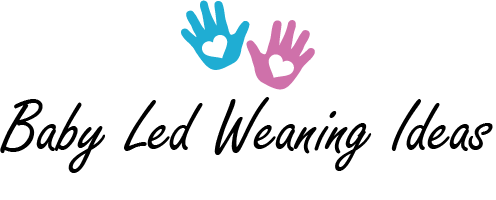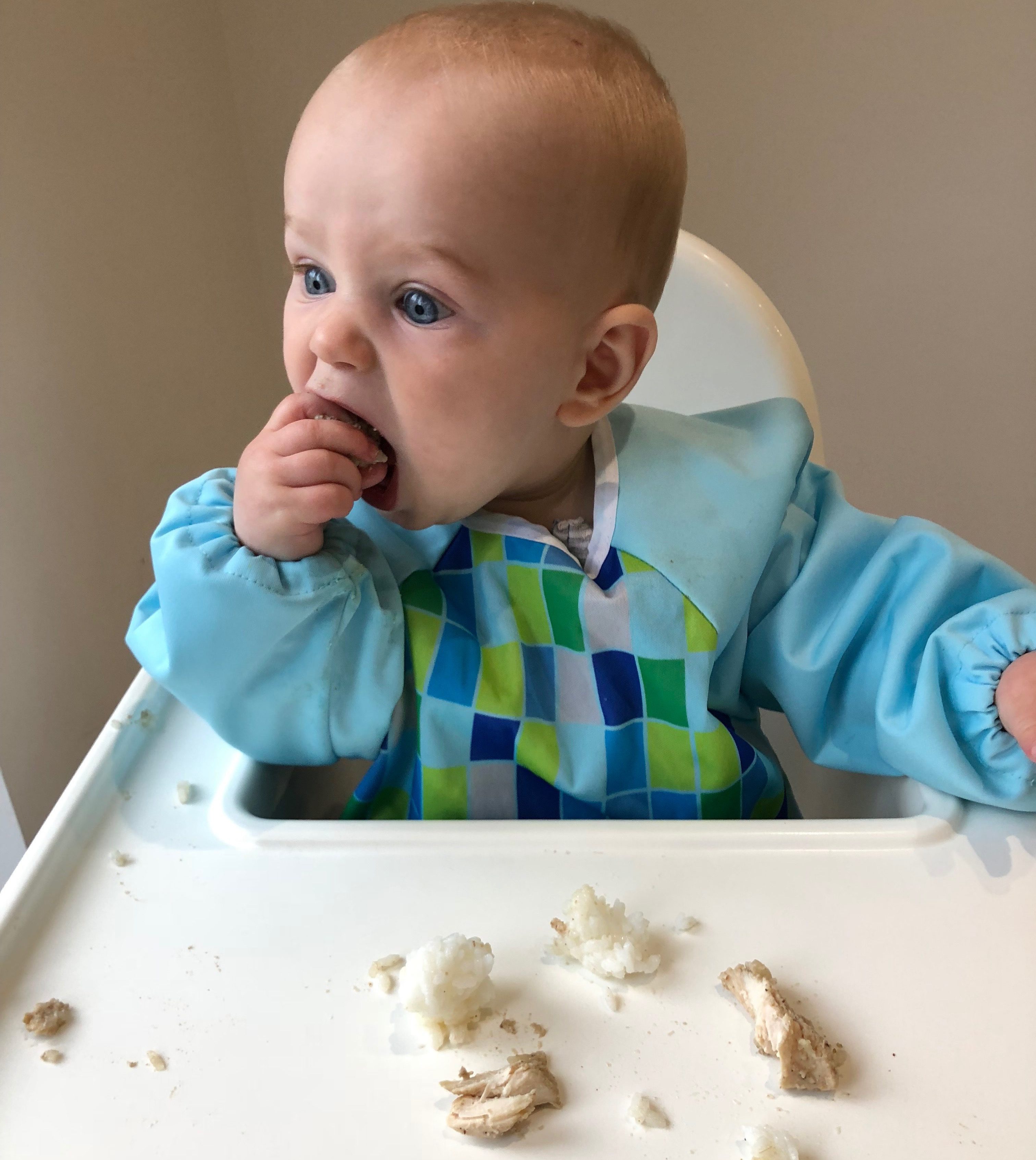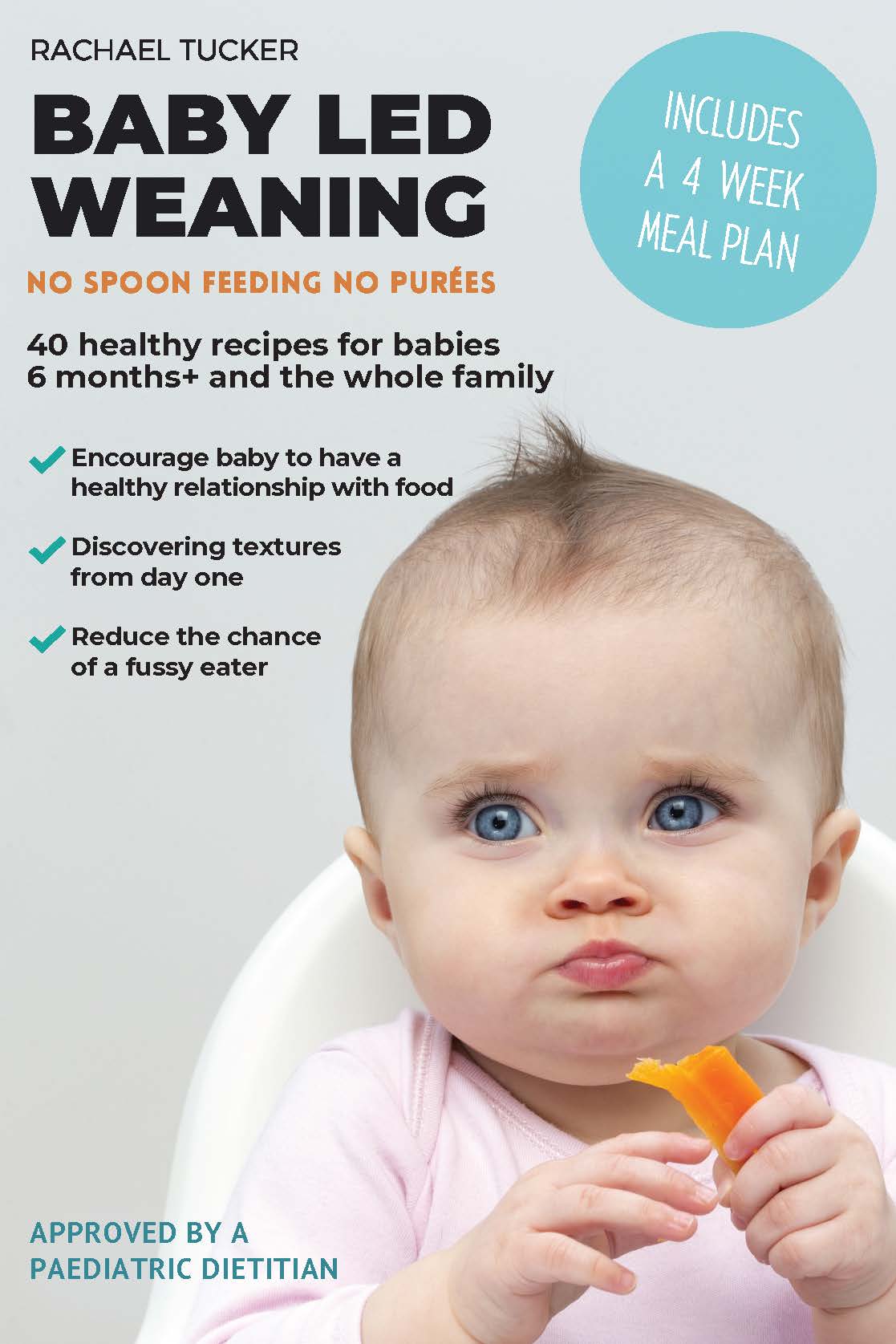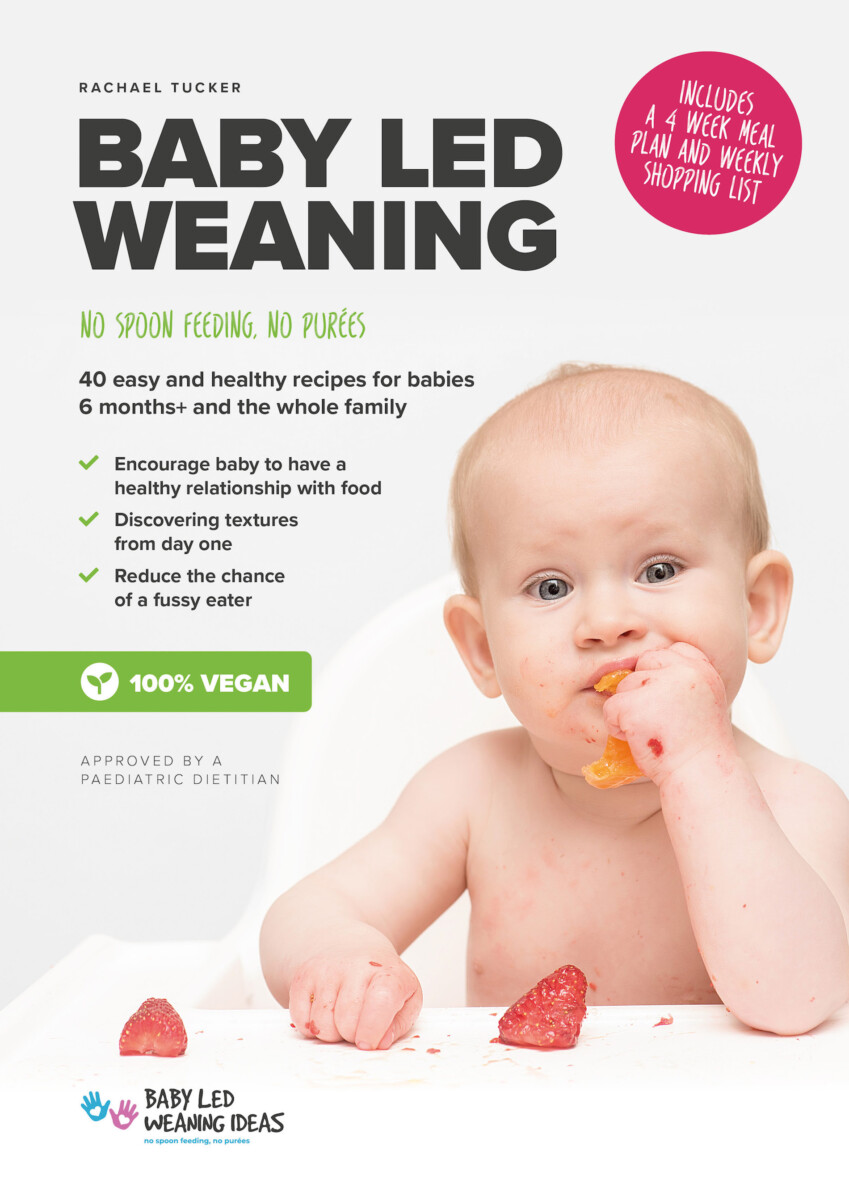Baby led weaning (BLW) is a way of introducing solid foods to your baby from around 6 months old.
BLW skips the puree stage due to the ability of babies from 6 months onwards to naturally handle finger foods. Offering finger foods from day one allows baby to control everything, from picking up the food, bringing it to its mouth, learning to chew and eventually swallowing… all this without any pressure or assistance from parents/carers. It’s like learning how to roll, crawl, walk or talk; eating is a learnt skill and baby will get there in its own time with lots of practice and trust.
All we need to do is offer a variety of appropriately cut foods, soft enough for baby to pick up, thus introducing different textures and sizes.
BLW is also about learning how to share family mealtimes with the emphasis on conversations and quality time at the table.
BLW encourages use of fine motor skills such as hand-eye coordination i.e. picking up food, feeling different textures and bringing it to its mouth.
By observing, you will come to know when baby has had enough to eat. Signs may be: frustration, fidgeting, disinterested, throwing food and wanting to get out of the highchair. If you are not sure if baby has had enough or wants more, offer more food.
“We loved baby led weaning! We started at 6 months old when Ava was showing all readiness signs. We found in the first few weeks of BLW it was mainly playing and learning how to bring food to mouth, chew and swallow. By 10 months old my baby was eating EVERYTHING! All my friends and family were amazed. My biggest tip to parents is to be patient, give it a few months focused of learning and master ‘eating’, whilst trusting your baby being in control of their own food at all times. Truth to say we now have a great little eater! Fuss-free meal times and Ava loves her food!”
What does Wean mean?
This is from the UK, not American. In the UK, ‘weaning’ means ‘adding complementary foods’, whereas in the States it means ‘giving up breastfeeding’.
Why Spoon Feeding is Unnecessary?
Spoon feeding is left over from the days when ‘our parents’ were advised to begin feeding their babies solids around 3 or 4 months of age (when their baby is too young to self-feed). Now days, health authorities including the world health organisation recommend to begin a babies solids journey around 6 months old. Research now indicates babies prior to 6 months old babies do not need solid foods, their bodies aren’t really ready for them, especially when breast milk (or formula) is the primary nutrition for babies within the first year of life. If you wait to your baby is 6 months old, this means you have skipped the spoon-feeding stage. At 6 months old babies are clever enough to feed themselves and they do not need to be spoon fed. Babies at 6mo want to handle their food themselves and love to discover new textures with their hands and mouth – it is a natural instinct! That is why Baby Led Weaning is the PERFECT way for your baby to discover food and textures naturally.
When to start BLW?
From 6 months old (rarely any earlier) when baby is showing all readiness signs to start baby led weaning.
Readiness signs
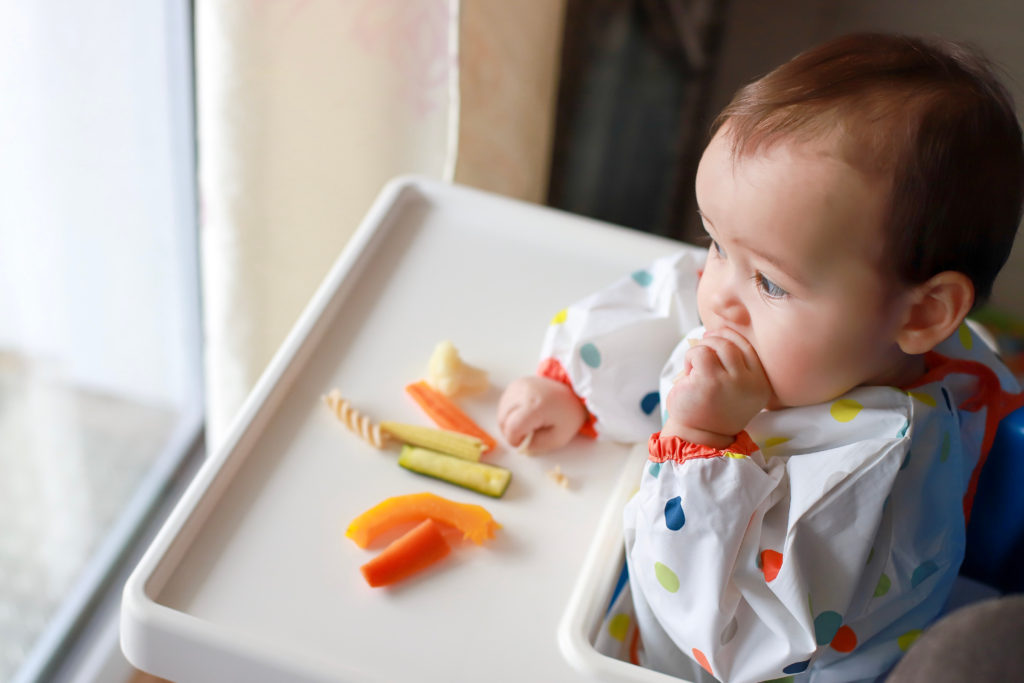
Around 6 months old (rarely any earlier) baby will start to show signs of readiness, which will determine when baby can commence BLW.
They’ll be able to:
- Can sit up with little or no support (Click here for definition for sitting upright)
- Can hold its head steady with a good neck and head control
- Can reach out, grab food effectively, take it to its mouth accurately and make gnawing and chewing motions
The following behaviours can be mistaken by parents as signs that their baby’s ready for solid foods:
- chewing their fists
- waking up in the night (more than usual)
- wanting extra milk feeds
These are all normal behaviours for babies and not necessarily a sign that they’re hungry or ready to start solid food.
Did you know? babies chew with their gums to begin with!
The benefits of baby led weaning
- It is enjoyable! Playing an active part in family mealtimes and being in control what, how much and how slow to eat. Babies learn to eat themselves just like crawling, walking and playing.
- It is Natural! babies love to explore with their hands and mouth. With BLW a baby can explore family food at his own pace, in his own time. It is human instincts.
- Learns how to chew different shapes and food textures (looks, smells and tastes) from the very start of a babies food journey. Where with spoon-feeding everything is blended into one. Babies can then practice chewing and moving food around in their mouth skills, rather than suck and swallow (spoon-feeding). This is a very important and key benefit of BLW babies. Babies who start of spoon-feeding can find it harder to transition to ‘real solid’ foods as they get used to one texture. Learning to chew also helps with digestion and speech.
- Appetite control. Eating habits developed during infant/childhood can last a life-time. If babies eat at their own pace (deciding when they have had enough ore wanting more), choosing from a variety of healthy food options at meals times, “learn appetite control and how much their body simply needs at that point in time. This may be important part of preventing obesity.”
- No meal time battles or tricking baby. The philosophy of BLW is also about Mum and Dad NOT pressuring baby to eat. No airplanes, no games, no tricking baby or hiding food within food to make their baby eat a balanced diet or just to eat! Trusting your baby can make her own decisions and picking up/ playing and discovering foods from the very beginning (6mo+), no pressure to eat how much or how little, then there is no opportunity for mealtimes to become a battle. Stress-free, relaxed parents, relaxed baby all eating as a family.
- Less pickiness as a toddler. Eating as a family from the very start, being included in on mealtimes, no pressure, no battles, eating the same meals, no need to transition from baby foods to lumps then family meals (which many babies feel difficult), creates babies/toddlers that are less likely to be picky or fussy eaters.
- Baby isn’t left out and gets to engage and watch conversation with the whole family.
- Eating out is easier and family meal times are cheaper. No need to blend and spoon-feed at the table. Baby can simply have some of Mum or Dads meal or most restaurants have healthy sides on the menu.
- Better nutrition. As a BLW mum, as i am cooking for the whole family, we now watch our salt content, sugar and try to limit packet or preservatives when family cooking. Eating as a family and offering a healthy and varied diet, demonstrates and teaches babies/kids good habits for life!
Can you switch from purees to BLW
Yes, its never too late to switch to BLW. It may take a little longer for bub to pick up and eat food but he/she will get there.
Can we ‘do a bit of both’
BLW is about more than just offering your baby food to pick up – it’s about trusting her to know what to pick up and what her body needs. Topping bub up with purees after she has just played, defeats the purpose of trusting bub’s natural instincts. “So doing some self-feeding and some spoon feeding may work for you, but it’s not BLW.” (ref: Gill Rapley)
What first foods should I start with?
Here is a list of varied finger foods and textures that focus on important nutrients for babies. You can start with a variety of fruits, vegetables, legumes, beans, meats, starchy foods and dairy whilst introducing home-cooked family meals all from day 1 of baby led weaning. Family meals could be: vegetable chicken casserole, spaghetti bolognese, mild dhal curry, a tofu stir fry, shepherds pie or even a risotto! Introducing family foods from day 1 has so many benefits – makes life easier for the parent cooking with one meal cooked for all, exposes your baby with a varied meals, flavours and textures which may reduce the chance of a fussy eater later down the track!
Let’s take a look at foods that focus on great nutrients for babies:
- Vegetables: must be cooked and soft when serving to baby. Remove any thick hard skins. You could steam, boil, fry, roast or add in stir fry): broccoli, sweet potato, pumpkin, carrot, cauliflower, swede, spinach, green beans, zucchini/courgette, asparagus, kale, cabbage.
- Fruits: remove any thick hard skins, pips or stones. Fruits must be soft and big enough for baby to pick up. Banana, avocado, peach, pear, mango, kiwi, oranges, raspberries, strawberries, melon, papaya, plums, cucumber. If you want to offer apple try grating it or cooking it to soften (steam or baked apple)
- Proteins: this food group includes meat, fish, eggs, beans and pulses and is suitable from around 6 months. These foods contain important nutrients, such as iron and zinc, which are important for babies. Chicken, turkey, beef, lamb, pork, fish (no bones), eggs, lentils, beans, tofu, pulses such as chickpeas. Ensure these proteins are cooked, tender and soft enough to offer baby. These can all be offered as part of a family meal such as a casserole, roast dinner, spaghetti bolognese, tofu stir fry etc
- Dairy: pasteurised dairy foods such as full-fat yoghurt and cheese are suitable foods for your baby from around 6 months. Opt for full-fat, unsweetened or plain yoghurts as they don’t contain added sugars. Choose low sodium cheeses such as ricotta, creme fraiche, mascarpone, swiss, cottage, fresh mozzarella. Both dairy and dairy-free milks can be used in cooking or mixed with foods from around 6 months old, but not as a drink until your baby is 12 months. Then at 12 months old+ you can start to offer dairy or dairy-free milk (pea or soy) as a stand alone drink along with 3 meals a day and snacks.
- Starchy foods: potato, sweet potato, rice, wheat pasta (pasta shapes are fun!), spaghetti, pulse pasta, porridge, oats, cornmeal, millet, quinoa, toast, bread, pitta bread, chapatti. Try making healthy muffins, pancakes, breakfast loafs – check out all my recipes on my website!
- But remember – there’s no reason what so ever why your baby can not have a pile of spaghetti bolognese, a mild curry, mashed sweet potato to dive into, risotto, a roast dinner, salmon steak and sautéed vegetables, if that’s what the rest of the family is having (just watch salt, sugar, additives and processed ingredients).
Tip: cooked fruits and vegetables should be sturdy and soft enough for baby to hold, but not mushy that it breaks away. Any hard vegetables that cannot be squished or mashed using thumb and index finger, should be cooked longer or not offered.
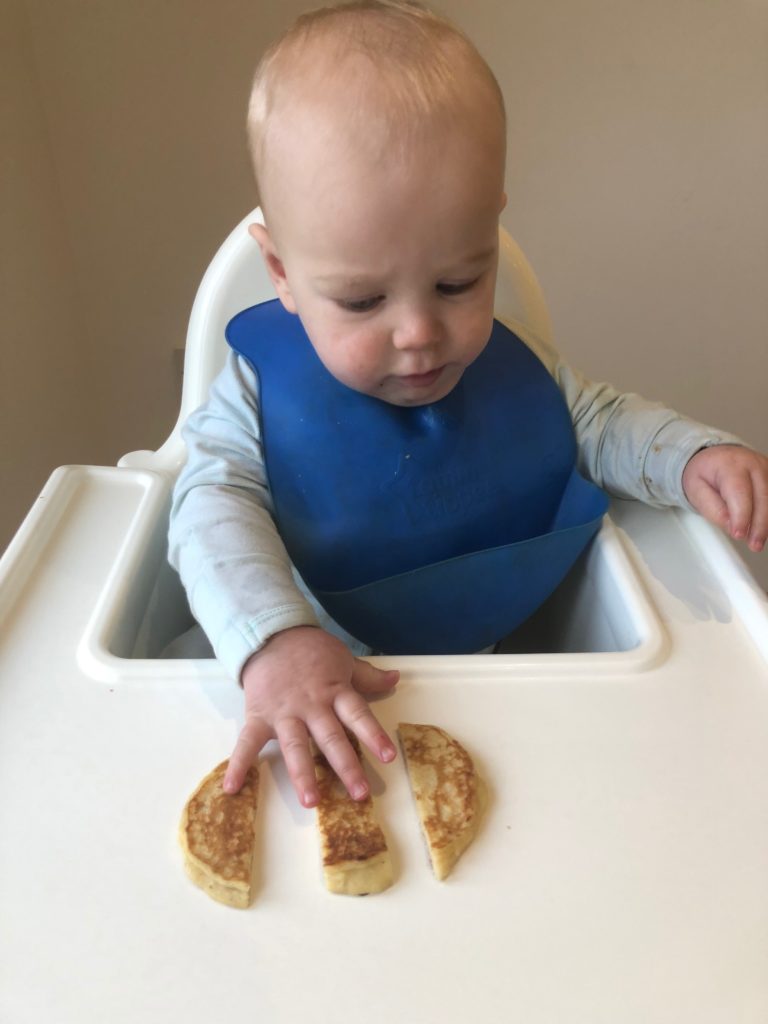
Allergies
Please consult your Health care professional if you have any questions or concerns about your baby and/or allergies. Here is some research on allergies and how to go about introducing potential allergy foods into babies diet. Recommendations do now state to introduce allergy foods early from 6 months old+ and before 12 months old, to reduce the development of an allergy, and continue to offer allergy foods in babies diet consistently to prevent allergy development.
Do note: some babies still develop allergies, especially if there is a family history of allergy or eczema.
The top allergenic foods: egg, nuts, dairy, fish, soy, wheat, soy.
Food to avoid in the first year
- Salt is bad for babies, their kidneys are not mature enough to deal with it.
Babies up to 1yr should have no more than 1g (0.4g sodium) per day. Watch out!!! for cheeses, bread, sausages, ham, bacon, yeast extract, brine, soy sauce, smoked meats, processed foods. A general shopping guide for mums/dads: A food high in salt = more than 1.5g (0.6g sodium) A food Low in salt = less than 0.3g per 100g. - Sugar: are empty calories, have no nutritional value. Contributed to tooth decay. To sweeten things up like yogurt try dried fruit, lemon, cinnamon.
- Some Fish: shark, swordfish and Marlin should be avoided, contains high levels of mecury which can affect a babies development of the nervous system. Raw fish has a high risk of food poisoning, safe if they are cooked. Oil fish (salmon, tour, mackerel, herring, sardines and fresh tuna is very nutritious, girls and women of childbearing age shouldn’t eat it more than twice a wk because of possible pollutants) boys,men and older women X a have up to 4 servings per wk).
Canned tuna doesn’t contain toxins ie tuna light or other oily fish, can be eaten more often. - Additives: monosodium glutamate and e-numbers which are artificial preservatives, Flavours and sweeteners should be avoided as much as possible, no nutritional value and can be harmful for babies and kids – linked to hyperactivity in children.
- Honey: avoid until your baby is over 1. Can cause botulism.
- Uncooked eggs: often salmonella which can make baby sick. Cooking destroys the bug. Cooked eggs (the whole egg) can form part of your baby’s diet over 6months+. Do note: if you are in the UK you can offer runny eggs from 6months+ ONLY if you buy the eggs that are “LOIN STAMPED”, these are protected eggs with no salmonella.
- Hydrogenated fats: avoid trans-fatty acids interfere with healthy fats, found in many processed foods. Most healthy foods don’t have them.
- Juice, sugar or sugar-free soft drinks: babies should drink breastmilk (or formula) and water (at 6m+) for the first year of life. Try to avoid introducing juice or sugar-sweetened beverages during the first year.
- Foods that are choking hazards: Grapes (always cut long ways in halves *or quarters if you don’t feel comfortable), cherries (remove stone), cherry tomatoes should be cut in half or quarters (longways), whole nuts and popcorn (avoided until at 5 years old) either crush them in foods or serve peanut butter or other nut butters, watch out for bony fish, cut off gristle on meats or anything that may contain hard pieces, cut sausages long ways, hard apple or raw carrot (from 6-10mo, until baby has developed more teeth).
- A few tips to take away: always sit with your baby or watch your child when they are eating. Discourage your child from walking, talking, watching television, lying down, or doing anything else while eating that might distract him/her from his meal.
Do I have to eat every meal with my baby
BLW is also about letting your baby join in on family meal times. Saying this, this means if you are cooking for the family what you usually cook, recipes may need altering. i.e. reduce the amount of salt, hidden salt (in stock etc), sugars, processed foods etc, These days not all households eat at the same time, your baby may go to bed earlier before you get home from work, both parents may work, baby may go to childcare etc doing BLW suggests just ‘try’ join in when bub is eating, even if you can sit and have breakfast with your baby or on the weekend eat with your baby or just grab a snack whilst your baby is also eating, so they don’t feel left out. This will make them feel more so part of the family. Eating with your baby boosts your babies confidence and understanding of what meal times is all about.
Regressions
YES! We had regressions around 12mo, 14mo, 16mo, 2yo, but we pushed through them all. New teeth, tummy bugs, a cold or a change in childcare environment can all lead to phases of fussiness or even developmental skills such as Ava learning about control or decision making skills (especially 2 years old). Think about the occasions when you don’t want to eat; your baby may well be experiencing exactly the same feelings. The key is to keep calm through these dips. Don’t rush him; this will put pressure on him, which can reduce his appetite and come across as fussiness. Try eating as a family, with lots of praise when he does eat. Also, try removing any distractions such as TV or toys. Example of a regression at 12mo: Ava went off vegetables for 2 weeks, we still kept offering them to her and variety but she didn’t eat them, the following week she was back on them – this is normal! We never persuaded Ava to eat the items of food, if she didn’t want to eat, we trusted that her body simply didn’t need those nutrients at that point in time. We never bribed or used persuasive language to entice Ava i.e if you eat your dinner you can have dessert. We just left her it! She decided all food choices, all Mum or Dad could decide was the foods we offered her (which was always most the time a healthy variety of foods).
Offer water with meals from 6 months old+
Healthy babies under 6 months do not need extra water. Breast milk and/or formula provides all the fluids they need. However, with the introduction of solid foods from 6 months old+ water can be added and offered to your baby (offer with meals). Also, a small amount of water may be needed in very hot weather, but check with your child’s doctor about how much is safe. And if you live in an area where the water is fluoridated, drinking water also will help prevent future tooth decay.
Drinks from 6-12 months old
Babies should drink breastmilk (or formula) and water (at 6m+ when starting solids) for the first year of life. Try to avoid introducing juice or sugar-sweetened beverages during the first year.
Join a baby led weaning support group
Please join my support group Facebook group ‘Baby led weaning support & ideas group’, I created this group for mum, dads, grandparents, caregivers, childcare workers etc to have somewhere for BLW support. The group has hundreds of mums/dad etc seeking support and can ask the other members questions about BLW to help each other out, post photos, encouragement and motivation along their BLWing journey and food discovery. This group does not provide professional advise its just a forum for sharing experiences.
Please consult your paeditrition and speak with your health visitor or doctor if you have any concerns about your baby’s eating. Many health centres offer weaning ‘clinics’ and advice on different meal options.
Reference:
- https://www.nhs.uk/conditions/pregnancy-and-baby/solid-foods-weaning/
- https://www.nhs.uk/start4life/weaning/what-to-feed-your-baby/around-6-months
- http://www.rapleyweaning.com
- Frequently asked questions Baby Led Weaning Gill Rapley
- http://www.rapleyweaning.com/assets/Sitting_upright.pdf
- World Health Organization
- The method of BLW became popular about a decade ago after the publication of the Baby Led Weaning: The Essential Guide to Introducing Solid Food by UK author Gill Rapley.
